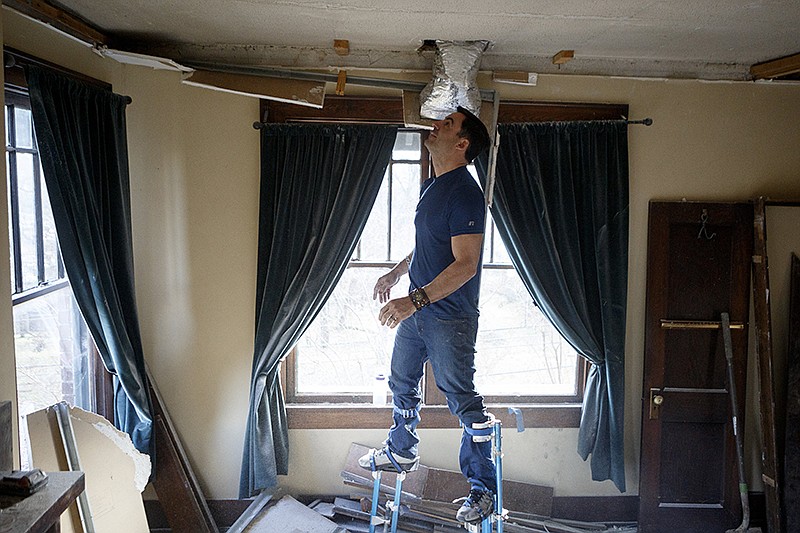The woman called home contractor Allan Chambers, asking if he had a wet vac that could suck up some water in her house.
"No," he said.
"Have you got a kayak?" she replied.
Chambers had given the woman's husband an estimate of $230 to repair a faulty hot water heater, but the man decided he could fix it himself. An inch of water in the living and dining rooms later, the insurance company put the fix-it tab at $5,500.
And the hot water heater was still broken.
"After about 10 times in those situations, I learned not to walk in and say, 'What idiot did this?' because the wife would point at her husband," Chambers laughs.
Although it has never been scientifically proven, there apparently is a chromosome in some men that makes them believe they're capable of fixing anything from a non-working water heater to a nuclear reactor. A screwdriver, pliers, a hammer, maybe a wrench or two, and the man's chest swells, his shoulders square and a look of steely determination appears on his face.
That expression turns to dismay when the man gets halfway through the job and realizes he is in way over his head. By that time, though, there may be electrical wiring hanging out of wall sockets or a ceiling fan dangling dangerously from the ceiling. Water may be turned off to the house and can't be turned back on because who wants a geyser at the kitchen sink?
"I will have wives of the husbands call me and say, 'He is in over his head. And he won't admit it. How do I help him?' Or, 'He has stopped working because he's gotten to a place where he doesn't know what the hell he's doing,'" says Maddie Kertay, who has renovated several homes.
Among other tasks, she has redone bathrooms, replaced electrical outlets, hung kitchen cabinets, replaced rotted flooring and repaired plaster walls.
"I have a few guys who are friends ask for advice or call to talk through an idea," she says. "But, in general, guys are not such good askers and instead will get themselves in a world of hurt before wounding their pride by asking for help, especially from a woman."
She has spent so much time in Lowe's, usually on a daily basis, that she once heard her name called over the intercom.
"I thought, No! What have I done?'" she laughs.
But Kertay wasn't in trouble at all - another customer needed advice on a DIY project and the store employees knew she was in the store.
Both Kertay and Chambers have the same advice for DIY'ers who get stuck. It's advice they should take even before starting their project, the pair says.
"Get on the freakin' internet," says Kertay. "There's just everything out there that you can learn. Now you really have to know your source, because there's some bad advice on the internet. There's some seriously wrong and dangerous advice."
Chambers calls YouTube an "amazing university."
"If there's a job you want to do, you can find literally anything and someone's made a video of it," he says.
Not much of a car-repair guy, Chambers recently used YouTube to fix a small leak in the sunroof on his wife's car. The fix-it was easy and worked perfectly, he says.
With more than 30 years in the contractor business, Chambers says he's heard it all from over-confident DIY guys who find themselves in a bad situation.
"My favorite is: 'If I had the knowledge and the tools, it would be easy.' I feel exactly the same about brain surgery. If I had the knowledge and the tools to do brain surgery, I'm pretty sure I could do brain surgery."
Pro tips
* Before entering into a project, take a trial run. Never try out a new skill while working on a permanent endeavor.* If tackling a large project, apply the brakes before your begin. Preparation saves you tons of hassles: trips to the store, additional labor and costly replacement parts.* If installing a new addition, check local codes to see if it’s legal.* Take a few weeks to think about the project. Let your ideas percolate before going to the hardware store. Then make a thorough list and buy in multiples when it comes to brushes, rollers and other small items.* Always consider safety beforehand: shutting off electricity or waterlines, wearing goggles and boots, and making sure the area is barricaded from passersby.* Consider whether the project is a good candidate for DIY based on the perceived difficulty and savings. Drywall repair, for example, is a viable DIY project but still more complicated than many people realize, frequently getting them into trouble. Deck building and fence building, for example, are also viable DIY projects, yet the structures built by capable homeowners will often have comparably short life expectancy because you simply can’t match the expertise and precision of professional installation.* Expand what you consider as do-it-yourself. Many homeowners don’t even entertain the idea that they can serve as their own general contractor or project manager for their major home renovations and remodels.* Never face a project alone. Most situations call for a crew.* Know when you’re in over your head. If things get too big, complex or demanding, call a service professional to help with the project.Source: HomeAdvisor.com
